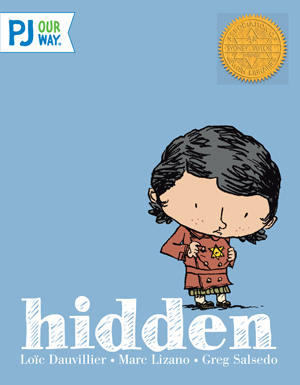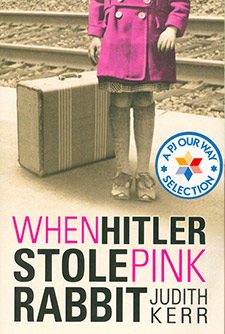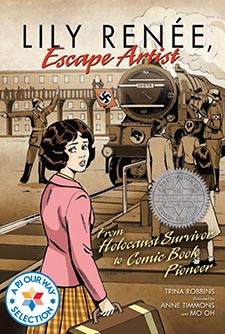Hidden
Dounia is now a grandmother. But when she was a little girl in France, she had to hide from the Nazis. This is her story.
Average Rating
( hint: Login to leave a review! )
444 Reviews
Leave Review
What the Book Is About
Jewish Content & Values
Positive Role Models
Content Advisory
Talk It Over
More for You
What the Book Is About
Elsa wakes up in the middle of the night to find her grandmother thinking about her childhood in France, when the Nazis came to power. Dounia tells Elsa about her experiences: hiding and not being able to make a sound for fear of discovery, her parents being taken away, being taken in by non-Jewish neighbors, escaping to a farm and pretending to be Catholic, and the eventual return of her mother from a concentration camp. As an introduction to the Holocaust for young readers, this graphic novel gives the right amount of detail for children of this age – appropriately disturbing, but it won’t give them nightmares – while also showing enough kindness by adults and even moments of happiness in Dounia’s time in the country to give the book a hopeful tone. The illustrations, with large round heads and small bodies, add a suitably childlike quality.
Jewish Content & Values
- Dounia is protected by non-Jewish friends and strangers who practice chesed (loving kindness) during the war, some even risking their own lives to save her.
- This story takes place during the Holocaust, starting from the early stages of discrimination against Jews, to Dounia going into hiding, to her mother’s survival and the discovery that her father has been murdered.
Positive Role Models
- Dounia is brave after her parents are taken away. She shows tremendous courage when she must take on a false identity and pretend that Mrs Pericard is her mother even though she misses her own mother so much.
- Mr. and Mrs. Pericard, the non-Jewish neighbors downstairs, take Dounia in and care for her when her parents are taken away. Mr. Pericard is arrested by the Nazis for sheltering her and Mrs. Pericard escapes with Dounia to a safe house in the country, where she continues to act as a surrogate mother.
Content Advisory
The almost whimsical drawings help to keep the book age appropriate, but there are a few scenes that may be more disturbing than others. Early in the book, Dounia’s friend Isaac has to climb onto his desk and pull his pants down in front of the class, who are told that "Jews had a piece of wee-wee missing" (this is not shown). When Dounia’s mother returns from the camps, there is a harrowing full-page illustration of her looking hollow-eyed and haunted.
Talk It Over
Mr. and Mrs. Pericard hardly know Dounia’s family, yet they risk their lives to hide Dounia. During World War II, many people across Europe took risks like this. What would you be willing to risk to save another person’s life?
More for You
There were several organizations helping Jewish children in France during World War II. One of them, Oeuvre de Secours aux Enfants (OSE), ran orphanages for and educated children whose parents had been murdered or deported. Not only organizations saved Jewish lives: the entire Protestant town of Le Chambon sur Lignon felt that they had a duty to help rescue Jewish children and risked their lives to do so. After the war, 32 townspeople were recognized by Yad Vashem as Righteous Among the Nations. In total, around 7,000 Jewish children in France were saved because of the efforts of various non-Jewish individuals and groups.
What the Book Is About
What the Book Is About
Elsa wakes up in the middle of the night to find her grandmother thinking about her childhood in France, when the Nazis came to power. Dounia tells Elsa about her experiences: hiding and not being able to make a sound for fear of discovery, her parents being taken away, being taken in by non-Jewish neighbors, escaping to a farm and pretending to be Catholic, and the eventual return of her mother from a concentration camp. As an introduction to the Holocaust for young readers, this graphic novel gives the right amount of detail for children of this age – appropriately disturbing, but it won’t give them nightmares – while also showing enough kindness by adults and even moments of happiness in Dounia’s time in the country to give the book a hopeful tone. The illustrations, with large round heads and small bodies, add a suitably childlike quality.
Jewish Content & Values
Jewish Content & Values
- Dounia is protected by non-Jewish friends and strangers who practice chesed (loving kindness) during the war, some even risking their own lives to save her.
- This story takes place during the Holocaust, starting from the early stages of discrimination against Jews, to Dounia going into hiding, to her mother’s survival and the discovery that her father has been murdered.
Positive Role Models
Positive Role Models
- Dounia is brave after her parents are taken away. She shows tremendous courage when she must take on a false identity and pretend that Mrs Pericard is her mother even though she misses her own mother so much.
- Mr. and Mrs. Pericard, the non-Jewish neighbors downstairs, take Dounia in and care for her when her parents are taken away. Mr. Pericard is arrested by the Nazis for sheltering her and Mrs. Pericard escapes with Dounia to a safe house in the country, where she continues to act as a surrogate mother.
Content Advisory
Content Advisory
The almost whimsical drawings help to keep the book age appropriate, but there are a few scenes that may be more disturbing than others. Early in the book, Dounia’s friend Isaac has to climb onto his desk and pull his pants down in front of the class, who are told that "Jews had a piece of wee-wee missing" (this is not shown). When Dounia’s mother returns from the camps, there is a harrowing full-page illustration of her looking hollow-eyed and haunted.
Talk It Over
Talk It Over
Mr. and Mrs. Pericard hardly know Dounia’s family, yet they risk their lives to hide Dounia. During World War II, many people across Europe took risks like this. What would you be willing to risk to save another person’s life?
More for You
More for You
There were several organizations helping Jewish children in France during World War II. One of them, Oeuvre de Secours aux Enfants (OSE), ran orphanages for and educated children whose parents had been murdered or deported. Not only organizations saved Jewish lives: the entire Protestant town of Le Chambon sur Lignon felt that they had a duty to help rescue Jewish children and risked their lives to do so. After the war, 32 townspeople were recognized by Yad Vashem as Righteous Among the Nations. In total, around 7,000 Jewish children in France were saved because of the efforts of various non-Jewish individuals and groups.



